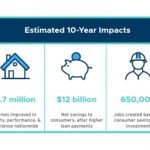How can we lower the lifetime emissions of building materials? Bernardino D'Amico at Edinburgh Napier University references his research to show how hemp-based materials can substitute for concrete. And it’s even more effective than timber, a popular low-carbon alternative. Growing industrial hemp can absorb twice as much CO₂ compared to growing trees. Raw hemp fibre can be processed into panels and mats for thermal or acoustic insulation. Hemp … [Read more...]
Heat Pump + Gas Boiler hybrids can reduce bills and emissions faster than a 100% heat pump roll out
The reduction in buildings emissions is well off track, not least in the residential sector. Something governments and millions of households are well aware of. The problem with replacing a gas boiler with a heat pump is the up-front cost and disruption. Installing the heat pump alone can cost several thousands more than replacing a gas boiler. On top of that, you should properly insulate your home and replace the radiators. Jovana Radulovic at … [Read more...]
Biosolar Roofs: solar panels mixed with vegetation can boost both power output and biodiversity
A biosolar roof is one that has installed both vegetation and solar panels on the top of a building. Does the presence of one obstruct the other, or do they in fact enhance each other? The answer is the latter, explain Peter Irga, Fraser Torpy, Eamonn Wooster, Charles Sturt, Robert Fleck at the University of Technology Sydney and Jack Rojahn at the University of Canberra who summarise their study. The vegetation cools the panels closer to their … [Read more...]
Building Materials “Embodied Carbon”: reaching net-zero with low-carbon cement, timber, modular design and more
In this explainer Madeline Weir, Audrey Rempher and Rebecca Esau at RMI first describe how embodied carbon is calculated. They then summarise the strategies being employed to reduce it, including using low-carbon, carbon-neutral, or even carbon-storing materials. New cement formulations are being developed with over 60% less CO2 emissions than the regular kind. Low-carbon mass timber is an alternative building material under development. On the … [Read more...]
Solar PV windows on highly glazed skyscrapers can cut energy by 40%+
Around a third of the world’s energy consumption and CO2 emissions come from buildings. Highly glazed skyscrapers and buildings may look beautiful and let in plenty of light, but waste a lot of energy due to the extra cooling needed in summer and heating in winter. Modern skyscrapers can have window-to-wall ratios of 70%+. But modern thermally efficient photovoltaic windows not only provide insulation but turn the absorbed light into power. Wayne … [Read more...]
Measuring the effect of radical protests on the public and the national agenda
Climate protest happen all over the world now. In some places they hit the news headlines hard because roads are blocked and cultural artefacts are vandalised by small numbers of protestors. These radical protestors are facing the “activist’s dilemma”: even though many of the public object to their methods, will the publicity help their cause? Colin Davis at the University of Bristol offers research that tries to measure the phenomenon. … [Read more...]
Energy Security: what if the UK government had not “cut the green crap” from 2013
The UK provides an example of a government that cut back its green ambitions only to see its energy security suffer. In 2013, then-prime minister David Cameron told his ministers to “cut the green crap”. That led successive governments to downgrade home energy efficiency, requirements for new homes to be “zero carbon”, end subsidies for onshore wind and solar, and effectively ban onshore wind in England. What if the UK had stayed on its … [Read more...]
Evaporation and Radiation cooling: no power required (but the aerogel must get cheaper)
It is well known that evaporation and radiation are two ways of keeping something cool. David Chandler at MIT explains how researchers there have created an experimental 3-layered cell that combines evaporation and radiation with an insulator to deliver cooling that needs no power. It can provide around 9°C of cooling from the ambient temperature, enough to permit safe food storage for about 40% longer under very humid conditions, and could … [Read more...]
Buildings Renovation: if Europe had started a decade ago it wouldn’t have a Russian oil & gas problem
It’s a message we are starting to see a lot. If ambitious climate policies struggling to be implemented today had been launched a decade ago, Europe wouldn’t have a Russian oil and gas problem. Andreas Rüdinger at IDDRI looks at buildings renovations in France. Two missed targets, proposed in 2008, are a 38% reduction in energy consumption in existing buildings by 2020, and 400,000 “major” renovations annually. If they had been met, natural gas … [Read more...]
Buildings Retrofits: inaccurate efficiency ratings are going to waste budget
Buildings renovations are going to be expensive, and complicated to roll out. Accurately predicting how much energy a building actually wastes will make that process easier and cheaper. EPC ratings are used to categorise the energy efficiency of homes. But Freya Wise at The Open University quotes research in Europe, along with her own investigations in the UK, to show that a lot of older buildings waste less energy than the standard estimates are … [Read more...]
How to ramp up Green Mortgages for climate-friendly house improvements
Green mortgages are used to finance climate-friendly house improvements. In the U.S. they already exist, but need to be made far more accessible and marketed widely. Greg Hopkins at RMI cites their report “Build Back Better Homes: How to Unlock America’s Single-Family Green Mortgage Market” to explain that the financial markets are looking increasingly favourably at lending that is certified as ESG (environmental, social, and governance). … [Read more...]
Buildings Renovation in Germany: success story or potential failure?
The German Federal Association of Housing and Real Estate Companies (GdW) has claimed that money and effort spent on the nation’s buildings renovations have not worked. But Andreas Rüdinger at IDDRI has looked into the evidence and concluded that the opposite is the case. CO2 emissions from the residential sector in 2018 were 37% lower than in 1990. Though final energy consumption was broadly stable, that’s because efficiency gains were offset by … [Read more...]
From Buildings to Solar Thermal: using electric charge to vary insulating properties tenfold
The insulating properties of a material don’t normally vary. Applying an electric charge to a material can vary its electronic and magnetic qualities, but not its thermal conductivity, normally. David Chandler at MIT says now a team of researchers there have found a way to do it. Their “electrical heat valve” can increase the thermal conductivity of thin-film strontium cobalt oxide (SCO) on demand by running a charge through it after adding … [Read more...]














